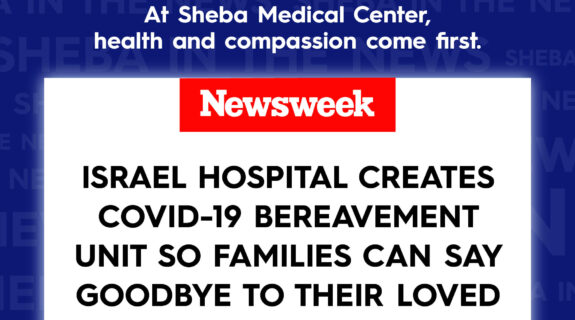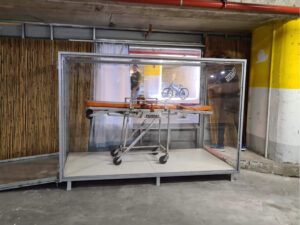
The largest hospital in the Middle East has constructed an isolated bereavement unit where families can say their final goodbyes to loved ones who have died as a result of COVID-19.
COVID-19 has claimed the lives of tens of thousands of people across the globe, with many families unable to visit their loved ones, even after death, robbing them of a vital part of the grieving process.
But the bereavement unit at Israel’s Sheba Medical Center now allows families to safely view the deceased through a large glass window without risking infection from the body, on which the virus may still be present.
“In Judaism and mankind, saying farewell and goodbye [during] mourning is very traditional,” Yoel Hareven, Chief of Staff at Sheba Medical Center, told Newsweek. “In this time of corona where most of the people that are dying are dying in the intensive care unit, which is isolated with very, very limited access even to the staff, most people cannot say goodbye and cannot say farewell the way [they want].”
“Some of them just want to see the process, some of the want to pray, some of them want to say farewell words,” he said. “So it became a very imminent need to make this available to the public. And because we are dealing with a very infectious and contagious disease, we need to [take] all the precautions that we can in order to protect those who are living. So we created the bereavement area in a very protective way while still enabling the families to say farewell and even to see the body.”
For families of COVID-19 patients, seeing their loved ones in these moments is particularly important given that, prior to death, many patients had spent days, or even weeks, isolated in hospital.
“It helps with the grieving process because you have to understand that most of [the families] didn’t see their [loved] one for a couple of days and sometimes, a couple of weeks. Normally, when people are going into this process and the situation is deteriorating, they have the ability to enter the ICU or the regular inpatient ward and stay until the point that the physician says, ‘Listen this is the last moment, come and say goodbye.’”
“But right now they have no ability because the ICU units are very secured and isolated,” he said. “Some families just want to see the body. They cannot kiss, they cannot touch because it’s [through] glass. Some of them are kissing the glass, because this is the next closest area to the body.”

The isolated bereavement unit at Sheba Medical Center, Israel.
Hareven says that during these moments, medical staff give the families as much privacy as possible, before the body is taken to a morgue.
“It’s a very special and private moment,” he said. “But if you see the circle of life as a complete circle, in a way, I think it’s our responsibility to enable them to say goodbye.”
Because the novel coronavirus is thought to persist on surfaces for several hours or even days, the body is sealed in two nylon bags before being taken to a morgue.
The bereavement unit is located in a former parking garage at Sheba that has been converted into an additional intensive care unit for COVID-19 patients, containing 90 beds with ventilators. The hospital treated Israel’s first coronavirus patients, residents who were quarantined on the Diamond Princess cruise ship.
And since February 21, a total of more than 330 COVID-19 patients have been treated at Sheba, 11 of whom have died at the time of writing. Hareven says that given the circumstances, the 2,000-bed hospital, which was ranked by Newsweek as one of the top 10 in the world, is relatively well prepared for the crisis. The hospital has boosted its ICU capacity, and is using advanced telemedicine techniques to treat patients at a distance while keeping medical personnel safe.
“Right now, we are in the process of converting another underground parking area into 180 ICU spots. We are assessing and processing every day what is good and what we need to improve. We prepared and trained our staff on time. So right now, I think we are ready. This is the second week that we are expecting the wave to come. It’s not coming. So the amplitude is staying very similar in the last few days, which for us is good news,” he said.